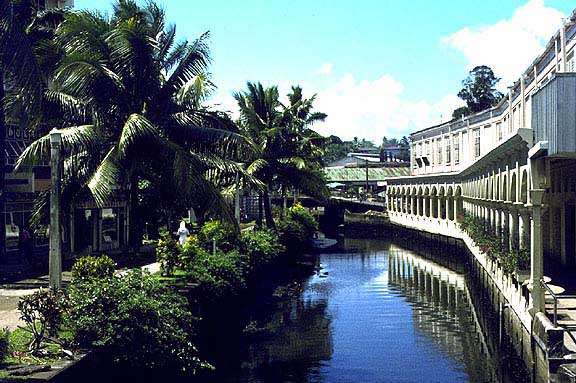
Kevin Cassell adapts to new culture while teaching students as part of his Peace Corps service
Volunteering in Fiji
NU lecturer adapts to new culture while teaching students as part of his Peace Corps service
By Sarah Reddington
News Staff
11/11/98
Traveling to the South Pacific island of Fiji sounds like paradise for most everyone. For Kevin Cassell, an English lecturer at Northeastern, serving in Fiji as a Peace Corps volunteer was a paradise of experience.
Cassell served in the Peace Corps from 1994 through 1996. He was placed at the Fiji College of Advanced Education in the town of Nasinu. It is Fiji’s only teacher training institution for secondary school teachers. Cassell taught his students the skills to pass onto other Fijians as they earned their teaching degrees.
“It really is a wonderful opportunity. I think it’s an excellent program. Americans are extremely lucky,” said Cassell. “The Peace Corps was the means by which I had the experience. For that I am very grateful.”
Often, students join the Peace Corps after graduation for lack of direction or uncertainty in their future. For 80 percent of them, it can be disastrous, said Cassell.
“A significant portion of my group was reluctant to give up their American lifestyles. It can be a tremendous source of frustration,” said Cassell of the six or seven people who left the program during their first year because it was not what they expected.
“I don’t know what they expected. Their heart wasn’t in it. They weren’t psychologically prepared for it. It is a decision that needs to be made with no small degree of consideration,” he said.
For Cassell, his cultural transition in Fiji was made easier by the two years he spent in Japan as a volunteer in the Japanese Exchange and Teaching Programme teaching English to Japanese students, prior to his Peace Corps service.
Because of his previous experience in the Far East, Cassell was better able to give up his American lifestyle and accept Fijian culture. By avoiding this “culture shock,” he was able to concentrate more on the services he had to provide, rather than being consumed by the new lifestyle.
He has even been back to visit friends since his volunteer service ended in 1996 and maintains correspondence with them.
In the Fijian culture, once you stay with a family they “adopt” you and make you part of the family. Cassell does not have to call or write to announce his arrival but merely show up and be welcomed with open arms.
Bugs, dirty water
and lasting friendships
Admittedly, Cassell’s position at a government-funded institution was cushy and much different than the jobs in rural schools that other members in his volunteer group experienced.
“I envisioned my Peace Corps experience in a mud, thatched-roof hut. I didn’t get what I expected, but I do not wish it was any different,” said Cassell. Although he lived in the capital city of Suva, in an apartment with running water, Cassell often stayed with friends and students in neighboring villages.
In the villages, Cassell lived as the Fijians did, sleeping with “bugs crawling over me at night, drinking unchlorinated water, and witnessing goats strung up and slaughtered,” he said.
Cassell had some other unusual experiences, including interrupting a robbery in his apartment and being chased by Fijian thugs with knives through the woods while half naked.
Despite these events, Cassell remembers Fiji and his friends with great fondness.
During his first year, one of Cassell’s students, Sunia Regede, applied a traditional Fijian tattoo to his left bicep. It was a long, complicated process that took nearly 12 hours over two days.
Cassell and Regede rigged up a needle using a sharpened clothesline wire inserted through a Bic pen. One end was curved and connected to a button and the extracted wheel from inside an audio cassette tape. Two wires then connected it to a battery to give it the vibrating motion needed to penetrate the skin. The sharpened end of the wire was then dipped in ink.
“He took so much care in doing it. I didn’t even pay him,” said Cassell.
As the “kesa-kesa” arm-band style tattoo was being applied in a traditional South Pacific warrior design, Cassell felt its emotional significance.
“I saw the artist side of him come out that I never saw in class. The care he took, I realized he was more than a student but a friend. When I look at [the tattoo] I remember Fiji, but more so the relationships and friendships with people.”
Peace Corps volunteers go through a selective application process and an intense 13-week training period in either the host country or the United States. The volunteers are trained in “everything — culture, language and specialized training” for their specific job, Cassell said. The Peace Corps prepares the volunteers for the “toughest job they will ever love.”
The Peace Corps was established in 1961 by President John F. Kennedy and Congress with goals of helping interested countries meet their needs with trained men and women and promoting a better understanding of the American people and the people of the countries served.
Since 1961, more than 135,000 Americans have served as Peace Corps volunteers in more than 115 countries in Asia, Africa, Europe, Central and South America, and the Pacific. Currently, more than 7,000 volunteers serve in more than 90 countries.
